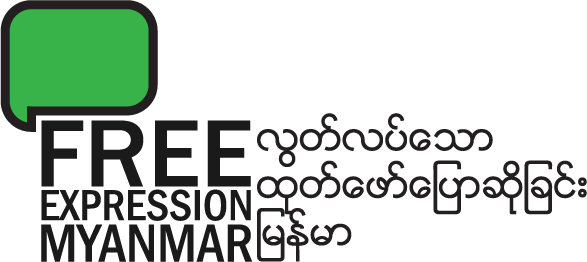Report: Daring to defy Myanmar’s patriarchy — ပေထရီအာခီတော်လှန်ရေး
Across Myanmar, women human rights defenders (WHRDs) exercise their right to freedom of expression to expose discrimination and injustice, name-and-shame perpetrators, and speak uncomfortable truths to power.
In doing so, they risk retaliation including physical, sexual, and psychological gender-based violence (GBV).
The risk of GBV is heightened when WHRDs confront gender-related taboos or patriarchal power, which are often labelled “sensitive” by society with the intention of shutting down any discussion of widespread discrimination and misogyny.
The Myanmar government does little to enable WHRDs to work free from the risk of GBV, despite domestic law and the government's international obligations. In many cases, the government condones and increases the risk of GBV.
For this report, FEM set out to better understand the risks faced by WHRDs working on the most “sensitive” gender-related taboos and challenges to patriarchal power in Myanmar. FEM’s research has come to several conclusions, including:
- All human rights defenders (HRDs) face risks when exercising their right to freedom of expression in Myanmar, but WHRDs face the added risk of GBV due to widespread gender-based discrimination.
- WHRDs expressing themselves on the most “sensitive” of gender-related taboos or challenges to patriarchal power face heightened levels of risk. This includes: campaigning for the rights of lesbians, bisexuals, and transgender people; challenging sexual violence in conflict; promoting sexual and reproductive rights; and advocating for women’s participation and leadership.
- There are several distinct types of GBV. The most commonly-reported by WHRDs in Myanmar are: attacks on life, bodily and mental integrity; attacks on personhood and reputations; and violations of privacy. All types are interlinked and WHRDs rarely face only one.
- The risk of GBV is aggravated by Myanmar's background of patriarchy, militarisation, and religious extremism.
- The risk of GBV comes from all parts of the government and security services, as well as from community and family.
- State, community, and family “protection” mechanisms generally seek to control WHRDs and limit their rights rather than reduce the risks that they face.
- WHRDs have risk mitigation and management strategies and tactics, but these are mostly informal, rather than based on risk management training, and not widely shared.
Click here to download Daring to defy Myanmar's Patriarchy (5mb) in both English and Burmese >>
မြန်မာပြည်တခွင်တွင် အမျိုးသမီးလူ့အခွင့်အရေးကာကွယ်သူများသည် ခွဲခြားဆက်ဆံမှုများနှင့် မမျှတမှုများအကြောင်း ဖော်ထုတ်တင်ပြရန်၊ ကျူးလွန်သူများကို အမည်ထုတ်ဖော်အရှက်ရစေရန်နှင့်၊ သြဇာအာဏာ ရှိသူများအား စိတ်မသက်မသာဖြစ်စေသည့် အမှန်တရားများကို ထုတ် ဖော်ပြောဆိုရန် ၎င်းတို့၏ လွတ်လပ်စွာထုတ်ဖော်ရေးသားပြောဆိုခွင့် ကို ကျင့်သုံးကြသည်။ထိုသို့ ပြုလုပ်ခြင်းအားဖြင့် ၎င်းတို့သည် ရုပ်ပိုင်းဆိုင်ရာ၊ လိင်ပိုင်းဆိုင်ရာ နှင့် စိတ်ပိုင်းဆိုင်ရာ GBV များအပါအဝင် လက်တုံ့ပြန်မှုများ၏အန္တရာယ် ထဲတွင် ကျရောက်နေကြသည်။
ကျယ်ပြန့်စွာပျံ့နှံ့သက်ရောက်လျက်ရှိသော Misogyny နှင့် ခွဲခြားဆက် ဆံမှုများအကြောင်း မည်သည့်ဆွေးနွေးပြောဆိုခြင်းကိုမဆို ပိတ်ပင် တားမြစ်ရန် ရည်ရွယ်ချက်ဖြင့်၊ လူ့အဖွဲ့အ စည်းက “အကဲဆတ်သည်” ဟု အမည်တပ်ထားသော ဂျဲန်ဒါရေးရာတားမြစ်ချက်များ၊ ကျားကြီးစိုး ရေးဆိုင်ရာတန်ခိုးအာဏာများကို အမျိုးသမီးလူ့အခွင့်အရေးကာကွယ် သူများက ထိပ်တိုက်တွေ့ဆုံသည့်အခါတွင် GBV အန္တရာယ်သည် ပိုမို၍ ပြင်းထန်ပေသည်။
ပြည်တွင်းဥပဒေနှင့် အစိုးရတို့၏ နိုင်ငံတကာအထူးတာဝန်များရှိသော် လည်း WHRD များအနေဖြင့် GBV အန္တရာယ်များမှကင်းဝေးစွာ အလုပ် လုပ်ကိုင်နိုင်ရေးအတွက်ကိုမူ မြန်မာအစိုးရသည် အနည်းငယ်သာ လုပ် ဆောင်ပေးသည်။ ကိစ္စရပ်အတော်များများတွင် အစိုးရမှ လစ်လျူရှုခြင်း အားဖြင့် GBV ဖြစ်နိုင်ချေအန္တရာယ်ကို မြင့်တက်လာစေသည်။
ယခုအစီရင်ခံစာအတွက် FEM အနေဖြင့် မြန်မာနိုင်ငံအတွင်း “အထိ ခိုက်လွယ်ဆုံး” ဂျဲန်ဒါရေးရာတားမြစ်ချက်များကို လုပ်ကိုင်ဆောင်ရွက် ပြီး၊ ကျားကြီးစိုးရေးဆိုင်ရာတန်ခိုးအာဏာကို စိန်ခေါ်လျက်ရှိသော WHRD များကြုံတွေ့ရသည့် ဖြစ်နိုင်ချေအန္တရာယ်များကို ပိုမိုကောင်း မွန်စွာ သဘောပေါက်နားလည်နိုင်ရန် ပြုစုတင်ပြထားခြင်း ဖြစ်ပါသည်။ FEM ၏ သုတေသနမှ အောက်ပါ လေ့လာတွေ့ရှိချက်အချို့ကို ရရှိခဲ့ပါ သည်။
- လူ့အခွင့်အရေးကာကွယ်သူအားလုံးသည် မြန်မာနိုင်ငံတွင်း လွတ် လပ်စွာထုတ်ဖော်ရေးသားပြောဆိုခြင်းအခွင့်အရေးကို ကျင့်သုံးရာ တွင် အန္တရာယ်များကို ရင်ဆိုင်ကြုံတွေ့ကြရသည်။ သို့သော် နိုင်ငံ တွင်း ကျယ်ပြန့်စွာကျင့်သုံးသက်ရောက်လျက်ရှိသော ကျား/မ မတူကွဲပြားမှုအခြေပြု ခွဲခြားနှိမ်ချဆက်ဆံခြင်းကြောင့် WHRDများ သည် GBV ကို ထပ်ဆောင်း အန္တရာယ်အဖြစ် တွေ့ကြုံခံစားကြရ သည်။
- “အထိခိုက်လွယ်ဆုံး” ဂျဲန်ဒါရေးရာ တားမြစ်ချက်များ သို့မဟုတ် ကျားကြီးစိုးရေးဆိုင်ရာ တန်ခိုးအာဏာကို စိန်ခေါ်လျက်ရှိသော WHRD များသည် ပိုမိုမြင့်မားပြင်းထန်သောအန္တရယ်များကို တွေ့ ကြုံရသည်။ ယင်းတို့တွင် - LBT လူ့အဖွဲ့အစည်း၏ လူသားရပိုင် ခွင့်များအတွက် ကင်မ်ပိန်းများပြုလုပ်ခြင်း၊ ပဋိပက္ခဒေသများအ တွင်းရှိ လိင်ပိုင်းဆိုင်ရာအကြမ်းဖက်မှုများကိုစိန်ခေါ်ခြင်း၊ လိင်နှင့် မျိုးဆက်ပွားကျန်းမာရေးဆိုင်ရာ အခွင့်အရေးများအား တိုးမြှင့်ဖော် ဆောင်ခြင်းနှင့်၊ ဆုံးဖြတ်ချက်ချနိုင်သောအခန်းကဏ္ဍနှင့် ခေါင်း ဆောင်မှုတွင် အမျိုးသမီးများ၏ ပါဝင်မှုအတွက် လှူံ့ဆော်စည်းရုံး ခြင်းများ ပါဝင်သည်။
- GBV အမျိုးအစားကွဲ များစွာရှိပါသည်။ မြန်မာနိုင်ငံတွင်း WHRD များမှ ထပ်တူအညီဆုံး မှတ်တမ်းပြုပြောဆိုခဲ့သည့် GBV မှာ - အ သက်အန္တရာယ်၊ ခန္ဓာကိုယ်နှင့်စိတ်ကျန်းမာရေးကိုတိုက်ခိုက်ခြင်း၊ လူသားဖြစ်တည်မှုနှင့် ဂုဏ်သိက္ခာကို တိုက်ခိုက်ခြင်း၊ ပုဂ္ဂလိကလုံ ခြုံရေးကို ချိုးဖောက်ခြင်း စသည်တို့ ဖြစ်သည်။ အမျိုးအစားအား လုံးသည် ချိတ်ဆက်မှုရှိပြီး၊ WHRD များအနေဖြင့် တစ်မျိုးတစား တည်းကို ရင်ဆိုင်ကြုံတွေ့ရသည်မှာ အတော်အတန်ပင် ရှားပါးလှ သည်။
- GBV ဖြစ်နိုင်ချေ အန္တရယ်မှာ မြန်မာနိုင်ငံ၏ နောက်ခံ မဟာဖိုဝါဒ၊ စစ်တပ်အုပ်စိုးခြင်း နှင့် ဘာသာရေးအစွန်းရောက်ဝါဒီများကြောင့် ပိုမိုဆိုးရွားသည်။
- GBV အန္တရယ်များသည် အစိုးရနှင့် လုံခြုံရေးဝန်ဆောင်မှု အစိတ် အပိုင်းအားလုံး အပါအဝင် လူအသိုင်းအဝိုင်းနှင့် မိသားစုများမှ လည်း လာသည်။
- နိုင်ငံ၊ လူ့အသိုင်းအဝိုင်း နှင့် မိသားစု “အကာအကွယ်” ယန္တရား များသည် အများအားဖြင့် WHRD များ ကြုံတွေ့နေရသည့် အန္တ ရာယ်များကို လျှော့ချပေးခြင်းထက် ၎င်းတို့ကို ထိန်းချုပ်ရန် နှင့်၊ ၎င်းတို့၏ အခွင့်အရေးများကို ကန့်သတ်ရန်သာ ဦးတည်ကြသည်။
- WHRD များတွင် အန္တရာယ်လျှော့ချရေး နှင့် စီမံရေး နည်းဗျူဟာ များ၊ နည်းပရိယာယ်များ ရှိကြသည်။ သို့သော် ယင်းဗျူဟာများမှာ အန္တရာယ်စီမံရေး သင်တန်းများ အခြေခံသည့် လုပ်ထုံးလုပ်နည်း များမဟုတ်သလို၊ ကျယ်ပြန့်စွာ မျှဝေထားကြခြင်းလည်း မရှိပါ။
Click here to download Daring to defy Myanmar's Patriarchy (5mb) in both English and Burmese >>
